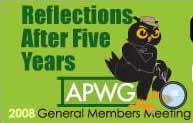 If you grew up in a small town, you’d likely cross the street without stopping to look each way. Try that in New York City, and you’ll end up in the hospital. Similarly, most of us grew up in meatspace and clicking on any old link in cyberspace often ends up with our bank account in the hospital.
If you grew up in a small town, you’d likely cross the street without stopping to look each way. Try that in New York City, and you’ll end up in the hospital. Similarly, most of us grew up in meatspace and clicking on any old link in cyberspace often ends up with our bank account in the hospital.
OK, that was my mangled simile, but it illustrates what Michael Kaiser and the National Security Alliance are trying to do: educate the public about what to do and not do in cyberspace without losing their audience with technical details or lengthy pedantic instructions. In his talk at APWG he had all sorts of interesting points, such as address different audiences (K-12, small business, elderly, etc.) differently, and that it’s not just unlearning bad habits (including ones that would be good habits in other contexts), it’s teaching good habits. ANd changing habits of any kind requires repetition and persistence. As Kaiser said, look at the CDC and its ongoing campaigns of prevention of HIV, domestic violence, etc.
Personally, I think staysafeonline.org could use more graphics and less text, or, more importantly, more storyline. It seems a tad pedantic to me. More poets in prevention! Or more marketing in staying safe. Or something.
But it’s a useful site already.

 Shing Yin Khor of Fox Interactive Media, which owns MySpace, gave an entertaining talk at APWG in which she gave a good case that MySpace has mostly eliminated phishing ads on MySpace and is busily suppressing other phishing.
Shing Yin Khor of Fox Interactive Media, which owns MySpace, gave an entertaining talk at APWG in which she gave a good case that MySpace has mostly eliminated phishing ads on MySpace and is busily suppressing other phishing.
